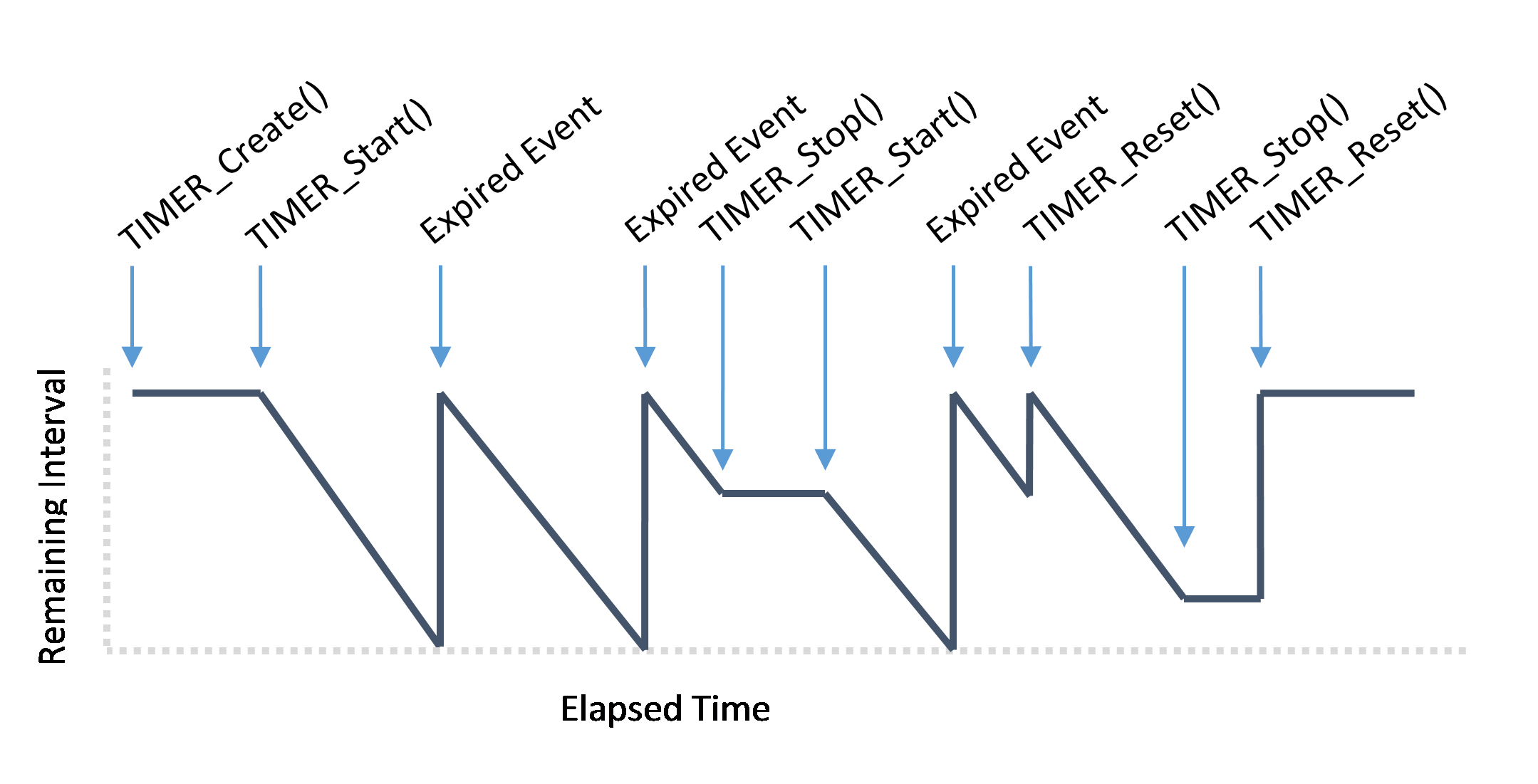Timers
A timer provides the ability to execute an application-defined function upon expiration of a specified time interval. A
timer can be started, stopped, reset, or restarted at any time from any code context, including from an interrupt
service routine (ISR).
A timer has the resolution of the kernel tick rate. When specifying a time interval, the accuracy is +1/-0 of a system
tick as the tick ISR is not synchronized with the starting time of a timer.
The graph below illustrates the remaining time before expiration for a timer as a function of run-time. The graph shows how the
different API calls affect the timer's remaining time.

Basic Usage
A timer can be used to repeatedly call an application-defined function. The code snippet below creates a timer that
expires every 100 kernel ticks (milliseconds by default). The timer is created with the options to have the timer started
and to have the timer automatically reset upon each expiration which causes repeated calls to the timer callback function.
#include "Kernel/kernel_timer.h"
#include <assert.h>
static TIMER timer1; /* Allocate a timer */
void APP_Example(void)
{
STATUS status;
status = TIMER_Create(&timer1, /* Create a timer */
"Timer1", /* A name for the timer (debugging purposes) */
APP_TimerCallback, /* A function to be called when the timer expires */
NULL, /* An optional argument (not used here) */
100, /* Interval, in kernel ticks */
OPT_START | OPT_AUTORESET); /* Start and configure as a repeating timer */
assert(status == SUCCESS);
}
void APP_TimerCallback(TIMER* timer, void* arg)
{
/* Called repeatedly every 100 kernel ticks (milliseconds by default) */
}
API Reference
STATUS TIMER_Create(TIMER* timer, const CHAR* name, TIMERCALLBACK callback, void* arg, UINT32 interval, UINT32 opt)
Creates and initializes a timer.
PARAMETERS
| timer | A pointer to a caller allocated timer object to be initialized. |
| name | A pointer to a NULL terminated string that represents a name for the timer. |
| callback | A function that will receive a callback when the timer has expired. |
| arg | (optional) A user defined argument object that is passed as the callback function argument. Can be NULL. |
| interval | The amount of time, in kernel ticks, between the timer's expiration events. |
| opt | Additional options to be applied to the timer.
| OPT_NONE | No options. Create a stopped timer in one-shot mode. |
| OPT_START | Use to have the timer started. |
| OPT_AUTORESET | Use to have the timer automatically reset after each expiration. |
|
| SUCCESS | The timer has been created and initialized. |
| ERR_NULLREFERENCE | The argument 'timer' or 'callback' was found to be NULL. |
| ERR_INVALIDCONTEXT | The operation is not supported from the context of an interrupt service routine (ISR). |
| ERR_ALREADYINITIALIZED | The specified timer has already been created and initialized. |
STATUS TIMER_Destroy(TIMER* timer)
Destroys and removes a timer from the kernel.
PARAMETERS
| timer | A pointer to the timer to be destroyed and removed. |
| SUCCESS | The timer has been destroyed and removed from the kernel. |
| ERR_NULLREFERENCE | The argument 'timer' was found to be NULL. |
| ERR_INVALIDCONTEXT | The operation is not supported from the context of an interrupt service routine (ISR). |
| ERR_NOTINITIALIZED | The specified timer has not been created and initialized. |
| ERR_ACCESSDENIED | The specified timer is currently executing it's callback function. |
STATUS TIMER_SetInterval(TIMER* timer, UINT32 interval)
Sets a new timing interval, in kernel ticks, for a timer.
PARAMETERS
| timer | A pointer to the timer to receive the new interval value. |
| interval | The new interval value for the timer. Must be greater than zero. |
| SUCCESS | The timer has been updated with the new interval value. |
| ERR_NULLREFERENCE | The argument 'timer' was found to be NULL. |
| ERR_INVALIDARGUMENT | The argument 'interval' was invalid. Must be greater than zero. |
| ERR_NOTINITIALIZED | The specified timer has not been created and initialized. |
STATUS TIMER_Start(TIMER* timer)
Starts a timer.
PARAMETERS
| timer | A pointer to the timer to be started. |
| SUCCESS | The timer has been started. |
| ERR_NULLREFERENCE | The argument 'timer' was found to be NULL. |
| ERR_NOTINITIALIZED | The specified timer has not been created and initialized. |
REMARKS
| If the timer is not expired, it will resume where it has last been stopped. Use TIMER_Restart() if starting the timer
over with a fresh complete timing period is the desired operation. |
STATUS TIMER_Stop(TIMER* timer)
Stops a timer.
PARAMETERS
| timer | A pointer to the timer to be stopped. |
| SUCCESS | The timer has been stopped. |
| ERR_NULLREFERENCE | The argument 'timer' was found to be NULL. |
| ERR_NOTINITIALIZED | The specified timer has not been created and initialized. |
REMARKS
| The timer's remaining time interval is left unchanged. |
STATUS TIMER_Reset(TIMER* timer)
Resets a timer by giving the timer a new full time interval.
PARAMETERS
| timer | A pointer to the timer to be reset. |
| SUCCESS | The timer has been reset. |
| ERR_NULLREFERENCE | The argument 'timer' was found to be NULL. |
| ERR_NOTINITIALIZED | The specified timer has not been created and initialized. |
REMARKS
| This will leave the timer in it's current state. |
STATUS TIMER_Restart(TIMER* timer)
Resets and starts a timer.
PARAMETERS
| timer | A pointer to the timer to be restarted. |
| SUCCESS | The timer has been restarted. |
| ERR_NULLREFERENCE | The argument 'timer' was found to be NULL. |
| ERR_NOTINITIALIZED | The specified timer has not been created and initialized. |
BOOLEAN TIMER_IsRunning(TIMER* timer)
Returns an indication of whether a timer is currently running.
PARAMETERS
| timer | A pointer to the timer to be checked for running status. |
TRUE if the timer is currently running; otherwise FALSE.